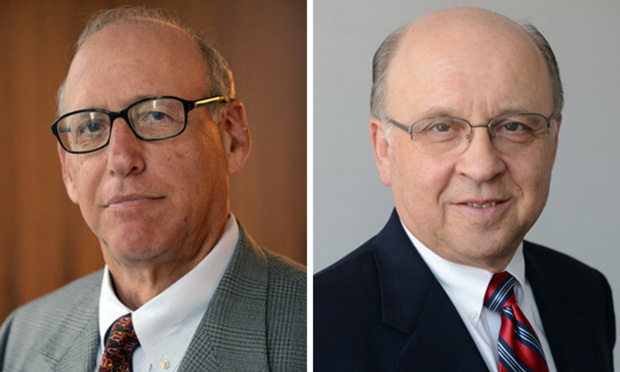Peter Brown

November 08, 2019 | New York Law Journal
Software Development Agreement Dispute Produces a Split DecisionA federal court in Texas recently decided that the progress (or lack thereof) concerning a software development agreement cannot be obscured by allegedly fraudulent statements, nor can breach be excused simply because the developer encounters what it claims as unforeseen technological hurdles. In their Technology Law column, Richard Raysman and Peter Brown discuss the split result reached by the court inasmuch as the court denied the software developer's motion to dismiss the software provider's breach of contract claim and denied in part the provider's fraud claims.
By Richard Raysman and Peter Brown
6 minute read

October 07, 2019 | New York Law Journal
What Happens When a Joint Venture To Develop Software Goes Wrong?The parties to a joint venture to develop virtual reality software in the education space recently found themselves in litigation arising over multiple software development agreements, including an agreement that derived from a purported failure to create software required by the initial agreement. In their Technology Law column, Richard Raysman and Peter Brown focus on this case, and specifically the breach of contract claims pertaining to both agreements.
By Richard Raysman and Peter Brown
7 minute read

September 09, 2019 | New York Law Journal
Licensor Forced To Arbitrate Dispute Over Software AgreementsIn their Technology Law column, Richard Raysman and Peter Brown discuss a recent SDNY case in which the court held that because of the unequivocal and broad language of the arbitration clause in the operative software license agreement and the dearth of prejudice from the protracted pace of the language, plaintiff could not avoid arbitration of its claims, which included contract and copyright-based claims.
By Richard Raysman and Peter Brown
7 minute read

August 12, 2019 | New York Law Journal
A Dispute Over a Software Maintenance Agreement Results in Victories for Both PartiesIn their Technology Law column, Richard Raysman and Peter Brown discuss a decision concerning the scope and interpretation of an agreement that required software maintenance. Specifically, the dispute centered around an alleged intra-corporate conspiracy to deprive plaintiff software maintenance services for imaging technology. As analyzed in greater detail in this column, the court issued rulings in both parties’ favor.
By Richard Raysman and Peter Brown
7 minute read

July 08, 2019 | New York Law Journal
Invoking Acceleration Clause Precludes Licensor's Claims Against SuccessorsTechnology Law columnists Richard Raysman and Peter Brown focus on the unintended consequences of accelerating payments under a software license, even if the clause appears to result in more immediate payment from the breaching party.
By Richard Raysman and Peter Brown
5 minute read

June 10, 2019 | New York Law Journal
Licensor Did Not Forfeit Rights Based on Past WaiversIn their Technology Law column, Richard Raysman and Peter Brown summarize the facts and procedural history of 'Medtron Software Intelligence Corp. v. Metairie Gastroenterology', where one party learned that reliance on oral modifications to a written agreement can successfully be opposed by an adversary citing to the plain, unambiguous terms of a contract.
By Richard Raysman and Peter Brown
7 minute read

May 13, 2019 | New York Law Journal
A Merger Clause Does Not Prevent Application of a Master Services AgreementIn their Technology Law column, Richard Raysman and Peter Brown discuss a recent decision wherein a software licensor was permitted to terminate a license that the licensee alleged continued in “perpetuity” on grounds that the merger clause in the license did not supersede a related master services agreement.
By Richard Raysman and Peter Brown
5 minute read

April 08, 2019 | New York Law Journal
An Illustrative Software License Dispute Concerning Both the Payment Amount and TermIn their Technology Law column, Richard Raysman and Peter Brown discuss 'Silver Mgmt. Grp. v. AdvisorEngine', in which the Delaware Chancery Court dealt with a software license dispute that concerned both the payment and term provisions. The court found for the licensor on the term issue and the licensee on the fee issue.
By Richard Raysman and Peter Brown
6 minute read

March 11, 2019 | New York Law Journal
Court Provisionally Compels Licensee to Submit to Software AuditSoftware audits have become so prevalent that companies offering “audit management software” have proliferated in recent years. In their Technology Law column, Richard Raysman and Peter Brown discuss the recent case “Master Tax LLC v. Ultimate Software Group,” involving a dispute over a licensee's refusal to allow a software audit which was designed to determine the licensee's compliance with its use of the license keys.
By Richard Raysman and Peter Brown
7 minute read

January 07, 2019 | New York Law Journal
Ambiguity in License Termination Provision Precludes Summary JudgmentTechnology Law columnists Richard Raysman and Peter Brown write: Ambiguity surrounding the termination provision of a software license is a frequent source of dispute. Imprecise wording, particularly with respect to the damages amount due upon breach, can often precipitate costly litigation centered on the interpretation of a mere handful of words in a license. They discuss a recent dispute of this nature decided by the U.S. District Court for the Southern District of New York.
By Richard Raysman and Peter Brown
6 minute read
Trending Stories
- 1Judge Denies Sean Combs Third Bail Bid, Citing Community Safety
- 2Republican FTC Commissioner: 'The Time for Rulemaking by the Biden-Harris FTC Is Over'
- 3NY Appellate Panel Cites Student's Disciplinary History While Sending Negligence Claim Against School District to Trial
- 4A Meta DIG and Its Nvidia Implications
- 5Deception or Coercion? California Supreme Court Grants Review in Jailhouse Confession Case
More from ALM
- Legal Speak at General Counsel Conference East 2024: Match Group's Katie Dugan & Herrick's Carol Goodman 1 minute read
- Legal Speak at General Counsel Conference East 2024: Eric Wall, Executive VP, Syllo 1 minute read
- Legal Speak at General Counsel Conference East 2024: Virginia Griffith, Director of Business Development at OutsideGC 1 minute read



